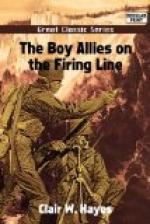“If it were not for the artillery we could hold this place indefinitely,” said Captain Anderson.
“Yes,” agreed Chester; “or, if we can manage to hold out till night, we may be able to get away.”
“It is possible, too,” said Hal, “that our absence will be noticed and aid sent to us.”
“I’m not banking much on that,” replied Captain Anderson, “for, if we are missed, our loss probably will be put down to the fortunes of war. It is hardly possible General French would know we are cooped up in this house.”
“That’s so,” said Chester. “Well, we will have to hold on as long as we can. That’s the best we can do.”
“Exactly,” agreed Hal quietly.
The three approached the window in front of the house on the second floor. But, even as they neared it, the rifle of the soldier guarding it spoke.
“Evidently the siege has begun,” said Hal grimly. “Poor fellow!” he added, as one of the men at the window toppled to the floor, a bullet in his head.
His place was quickly taken by another, and the battle went on. The firing became fiercer with each passing moment. The British barred the windows with chairs, tables, and whatever other articles of furniture they could find, leaving an opening just large enough to poke their rifles through.
But even this was not enough to keep out all the German bullets. Still men fell, though not as fast as before. Captain Anderson assigned Hal to direct the fire of the British in the front of the first floor and Chester in the rear. The captain took command of the second floor himself.
The three were everywhere encouraging the men, seemingly being all over their respective stations at once. Occasionally, as a man fell, Hal or Chester would step into the breach and hold the place until relieved by another soldier.
Noon came and went, and still the fighting continued. Apparently, thus far, the Germans had not conceived the idea of battering the house to pieces with their big field guns. Evidently they thought they could take it without this trouble.
And now darkness drew on. The German fire had played havoc with the defenders, but, if they had suffered severely, the enemy’s loss, exposed as they were to the grilling fire from the house, had been enormous.
Night fell, and with it came a lull in the firing. Hal took advantage of this respite to hurry upstairs for a word with Captain Anderson. As they conversed in low tones, they were startled by an outcry from the floor below.
Hurriedly descending the stairs, they beheld the cause of the commotion. Struggling in Chester’s arms was a man in civilian garb.
“I caught him just as he was about to open the front door,” Chester explained.
The man’s struggles were soon quieted, and he stood before Captain Anderson, pale and trembling.
“What are you doing here?” demanded the latter.




